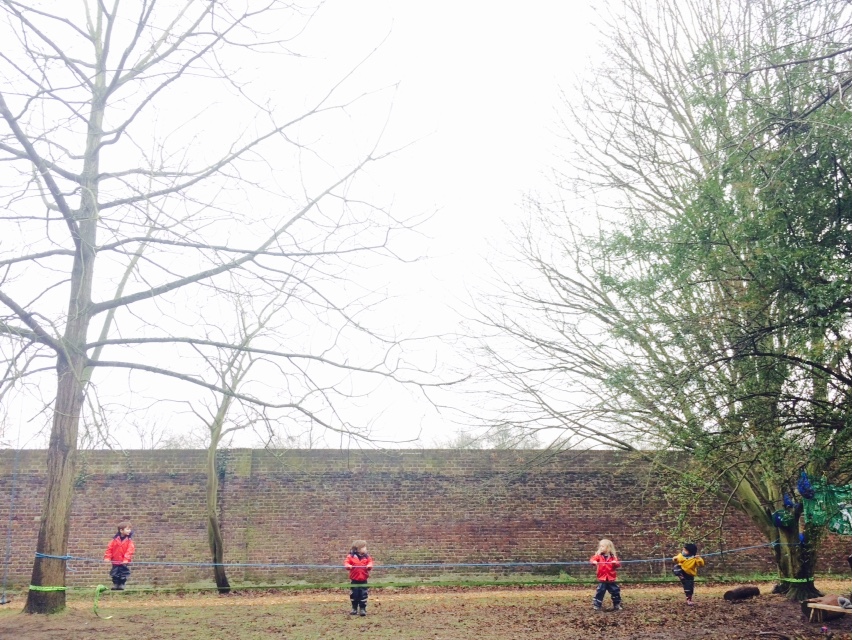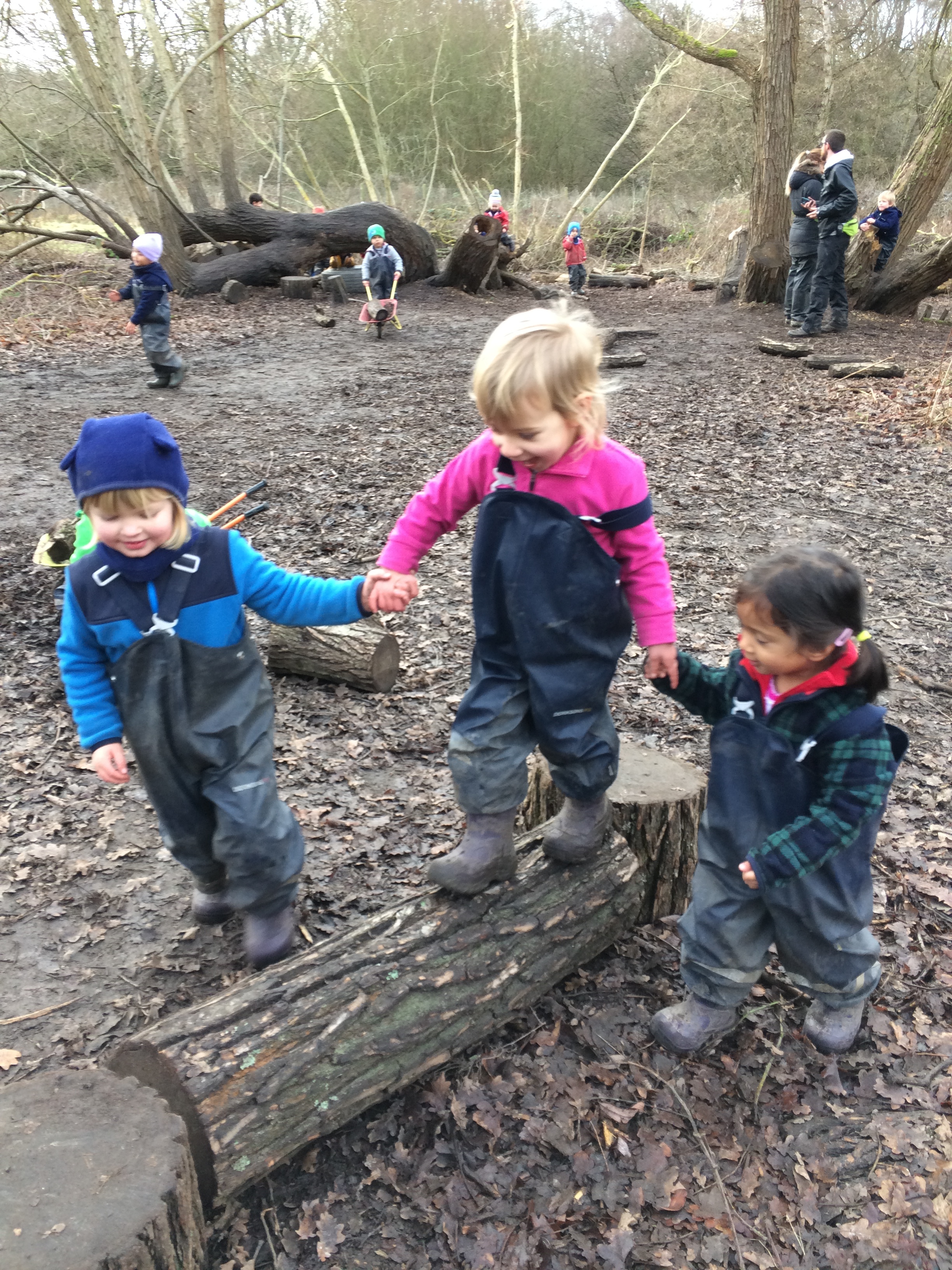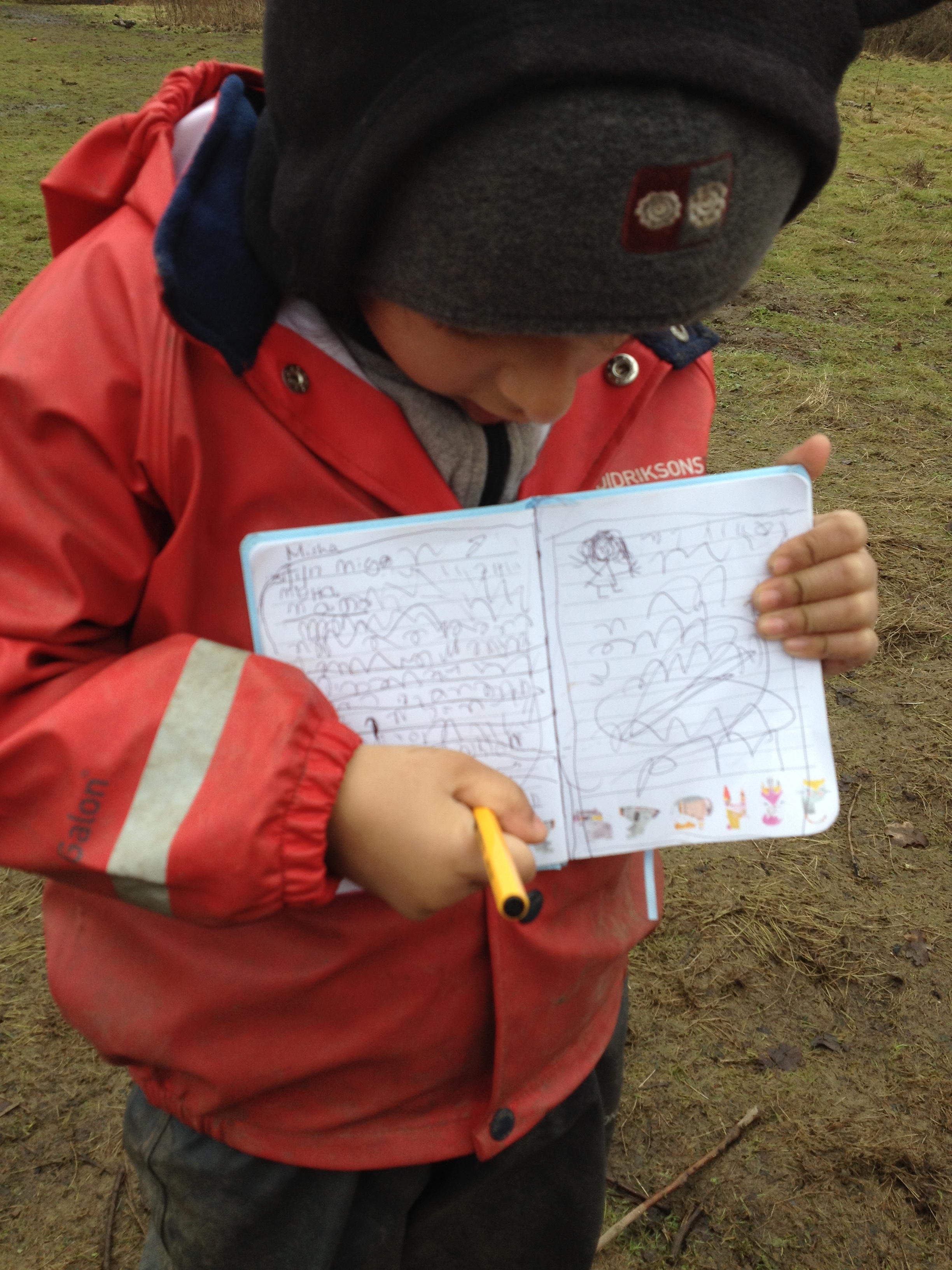A common topic on site visits is school readiness. Parents often look wistfully at the happy, free, liberated, engaged, laughing children and ask,
“But if all they do is play all day, how will they be ready for school?”
“If my child comes to Little Forest Folk do I need to tutor him at home? Or does he need to be attending a conventional nursery as well?”
When parents ask about school readiness, they almost exclusively are referring to literacy and the necessity to be able to sit still and listen.
Slack line skills
It's difficult for anyone to not see immediately and vividly from visiting our nursery how well equipped for school our children will be in terms of their characters and life skills. They are so obviously incredibly independent, confident, engaging, enthusiastic little learners.
Within 5 minutes of observing the children you see their kindness, their generosity of spirit, their compassion and their empathy for their fellow forest adventurers. You see them helping each other, coaching each other, teaching each other and encouraging one another.
“Go on, you can do it!”
Helping each other
You see their physical development is astonishingly advanced. You can observe 2 year olds climbing trees, watch as 3 year olds balance with wonderful coordination across slacklines, or on logs, often carrying treasures they've found in the forest. Their stamina and fitness levels surpass those of many adults. We put a Fitbit on a 3 year old last week and amazed even ourselves with the discovery that in a 6 hour stint in the forest on a not unusually active day he did 13,842 steps!
On a not particularly active day this is pretty impressive for just a 9.30am-3.30pm session!
Their language and communication skills are highly developed as the forest is such a communication rich environment that thousands of words are bandied about on a daily basis. The children use their language and communication skills to create the most wonderfully abstract imaginary play. Their creativity knows no bounds. They practice on a daily basis their personal risk management - through deciding which footholds to use whilst climbing, to using tools and even toasting marshmallows on the fire. They self regulate. They aren't shy of regulating each other 'DON'T pick and lick!'.
They pick themselves up when they fall. And often then laugh. They are resilient. They are determined. Watch a child try to transport muddy water from a puddle, try to work out how a pulley system works or try to build a den that stays upright and you will see a critical thinker who will be able to think outside the box to problem solve in the future. Watch the children who almost never play alone. See them collaborate, work together to find solutions to problems, or to create new games. And you will see how well equipped the children are to work in a team. And how ready they are for school and indeed for life.
Parents worry about children being so used to freedom, so used to self-directed education and joy that they will struggle to cope with the transition to an indoor sedentary school system. I'm not going to deny that for some children the transition is challenging. Not because they are not ready for school, but because school is not ready for them. The belief however that children who grow up enjoying our beautiful play in the forest can't sit still couldn't be further from the truth.
The levels of concentration and engagement we see from our children in the forest is astounding. When a child chooses what they are playing, when a child is fascinated by their play and by their learning, they are more than capable of sitting and concentrating. We've seen a group of 2 & 3 year olds sit for almost 40 minutes utterly absorbed in making mini dens for animal friends. Handily when an Ofsted inspector was visiting which certainly drew comments of how unusual this focus and behaviour was....and how impressive. If schools can provide learning that is meaningful, which is engaging, which fascinates children, they are more than capable of sitting. Spend a day with us and you'd clearly see how engaged and focused our children are on their play.
All of this can often bring tears to the eyes of parents visiting us. It's beautiful. But what, they still worry,
What about the LITERACY?
Firstly, literacy is about more than phonics. Literacy is more than carefully scribing what are essentially funny shaped hieroglyphics. Reading is more than carefully sounding out your letters to laboriously work through books. Learning about literacy is learning to love literacy. It's about enjoying books and understanding that you can get information from them. It's about using vocabulary from books. It's about hearing sounds in words and linking sounds to letters of the alphabet.
But there's still the nagging worry for parents that if their child is allowed to experience early years full of play, that they will somehow be left behind when they start school. We say, children will read and write when they are ready to. When they figure out that they have another way they can communicate, they will want to learn more. When they show an interest in reading or making meaningful marks, we will explore this interest with them, through their play.
I know, as a parent, this is a scary thing to do. To give up control. To trust in your child. And to have faith that when they are ready they will get there. I can often be found muttering under my breath like a mantra 'I am doing the right thing. This is best for them. They are happy. Everything else will come'. Which is why I have to share with you a beautiful moment in my life recently.
My 3 year old son has recently started to show a real interest in reading. He's been asking for more stories and wants to retell the stories when he comes home from the forest. He's been picking up sticks and mark making. Not attempting letters, but wanting to draw what are increasingly recognisable drawings, of animals, of faces and of rainbows. We've been watching this development with interest and have been providing the scaffolding he needs to take his interest to the next level. We haven't pushed him and we've simply played.
So imagine my astonishment when, during a cookery session on the weekend he wanted to claim a side of the oven as his own for his baked goodies. So I pulled across a sheet of foil, got out my sharpie and said, 'Ok, I will write your name for you and we will put it on the oven'. He replied, 'No, I will do it'. I handed the pen over, stepped back expecting to see some squiggles, and my amazing boy did this. He wrote his name!
So proud! :-)
I have to be honest, I cried a little. I'm so proud of this incredible boy. He's the kindest, most compassionate, thoughtful, energetic, loving, caring little ball of energy. And he's helping me daily reaffirm my vision. He is experiencing a magical and inspirational childhood. He plays outside, all day long in a forest. He's healthy. He's happy. He's developing astonishingly. And now, at 3 years old, having never wasted a minute of his childhood scribing phonics, he's written his name!
He will be ready for any school he attends, when he attends. I'm still hoping to create a primary school version of Little Forest Folk so that Jack can continue to enjoy a life full of freedom, personalised learning opportunities and FUN play. But I can smile and be quietly confident that wherever my son, and any of his forest playmates wind up, they will absolutely be the superstars of the classroom.







